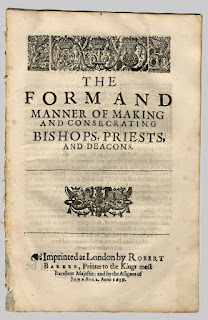"A continuation of consecration by bishops": Donne, the orders of the ecclesia Anglicana, and "our neighbour churches"
When our adversaries do so violently, so impetuously cry out, that we have no church, no sacrament, no priesthood, because none are sent, that is, none have a right calling, for internal calling, who are called by the Spirit of God, they can be no judges, and for external calling, we admit them for judges, and are content to be tried by their own canons, and their own evidences, for our mission and vocation, or sending and our calling to the ministry. If they require a necessity of lawful ministers to the constitution of a church, we require it with as much earnestness as they; Ecclesia non est que non habet sacerdotem, we profess with St. Hierome, It is no church that hath no priest. If they require, that this spiritual power be received from them, who have the same power in themselves, we profess it too, Nemo dat'quod non habet, No man can confer other power upon another, than he hath himself. If they require imposition of hands, in conferring orders, we join hands with them. If they will have it a sacrament; men may be content to let us be as liberal of that name of sacrament, as Calvin is; and he says of it, Non invitus patior vocari sacramentum, ita inter ordinaria sacramenta non numero [quoting from the Institutes], I am not loth, it should be called a sacrament, so it be not made an ordinary, that is, a general sacrament; and how ill hath this been taken at some of our men's hands, to speak of more such sacraments, when indeed they have learnt this manner of speech, and difference of sacraments, not only from the ancient fathers, but from Calvin himself, who always spoke with a holy wariness, and discretion.
Whatsoever their own authors, their own schools, their own canons do require to be essentially and necessarily requisite in this mission in this function, we, for our parts, and as much as concerns our church of England, admit it too, and profess to have it. And whatsoever they can say for their church, that from their first conversion, they have had an orderly derivation of power from one to another, we can as justly and truly say of our church, that ever since her first being of such a church, to this day, she hath conserved the same order, and ever hath had, and hath now, those ambassadors sent, with the same commission, and by the same means, that they pretend to have in their church.
And being herein convinced, by the evidence of undeniable record, which have been therefore showed to some of their priests, not being able to deny that such a succession and ordination, we have had, from the hands of such as were made bishops according to their canons, now they pursue their common beaten way, that as in our doctrine, they confess we affirm no heresy, but that we deny some truths, so in our ordination, and sending, and calling, when they cannot deny, but that from such a person, who is, by their own canons, able to confer orders, we, in taking our orders, (after their own manner) receive the Holy Ghost, and the power of binding and loosing, yet, say they, we receive not the full power of priests, for, we receive only a power in corpus mysticum, upon the mystical body of Christ, that is, the persons that constitute the visible church, but we should receive it in corpus verum, a power upon the very natural body, a power of consecration, by way of transubstantiation.
They may be pleased to pardon, this, rather modesty, than defect, in us, who, so we may work fruitfully, and effectually upon the mystical body of Christ, can be content that his real, and true body work upon us. Not that we have no interest to work upon the real body of Christ, since he hath made us dispensers even of that, to the faithful, in the sacrament; but for such a power, as exceeds the Holy Ghost, who in the incarnation of Christ, when he overshadowed the blessed Virgin, did but make man of the woman, who was one part disposed by nature thereunto, whereas these men make man, and God too of bread, naturally wholly indisposed to any such change, for this power we confess it is not in our commission; and their commission, and ours was all one; and the commission is manifest in the Gospel; and, since they can charge us with no erasures, no expunctions, we must charge them with interlinings, and additions, to the first commission. But for that power, which is to work upon you, to whom we are sent, we are defective in nothing, which they call necessary thereunto.
This I speak of this church, in which God hath planted us, that God hath afforded us all that might serve, even for the stopping of the adversary's mouth, and to confound them in their own way: which I speak, only to excite us to a thankfulness to God, for his abundant grace in affording us so much, and not to disparage, or draw in question any other of our neighbour churches, who, perchance, cannot derive, as we can, their power, and their mission, by the ways required, and practised in the Roman church, nor have had from the beginning a continuance of consecration by bishops, and such other concurrences, as those canons require, and as our church hath enjoined. They, no doubt, can justly plead for themselves, that ecclesiastical positive laws admit dispensation in cases of necessity; they may justly challenge a dispensation, but we need none; they did what was lawful in a case of necessity, but Almighty God preserved us from this necessity.




Comments
Post a Comment